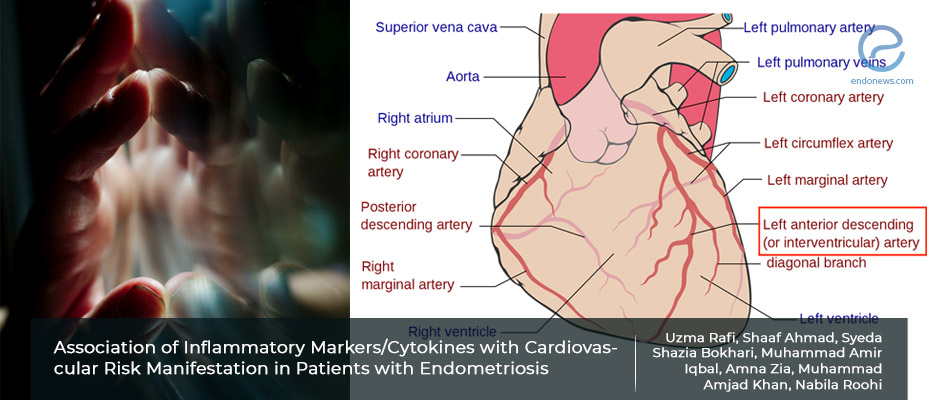Risk of cardiovascular disease in endometriosis patients
Apr 1, 2022
Endometriosis patients are at greater risk for atherosclerosis and cardiovascular diseases compared to healthy individuals, the study finds
Key Points
Highlight
- Endometriosis patients should be evaluated carefully for the manifestation of cardiovascular diseases as a link has been shown between these two diseases owing to their inflammatory nature.
Importance
- The endometriosis patients' inflammatory state creates a risk factor for atherosclerosis and cardiovascular diseases.
- The inflammatory marker levels have been shown to increase in endometriosis patients, putting them at further risk for cardiovascular diseases.
What’s done here
- This research study compared 81 women with endometriosis and 80 healthy controls in terms of the levels of CRP, fibrinogen, homocysteine, IL-17, and IL-33.
- It aimed to investigate the link between inflammatory mediators and cardiovascular disease manifestation in endometriosis patients.
Key results
- All of the markers investigated in the study were found to be elevated in different percentages in endometriosis patients.
- The increase in the levels of these mediators proves the patients to be in a hypercoagulable and inflammatory state.
- The increase in CRP levels indicates an increased risk of cardiovascular disease.
- Elevated fibrinogen levels cause thrombosis and contribute to cardiovascular pathologies.
- Hyperhomocysteinemia is considered an independent risk factor for atherosclerosis and cardiovascular disease and is also associated with a high mortality rate.
- IL-17 and IL-33 were also shown to be linked to myocardial damage and cardiovascular disease.
Lay Summary
A well-known fact about endometriosis is the inflammatory processes that underlie its pathophysiology. The inflammatory markers have been thought to play a role in many additional disorders in endometriosis patients.
One of the primary markers of inflammation is C-reactive protein which was shown to be an indicator of infection, inflammation, and tissue damage, and is thought to be associated with increased risks of cardiovascular disease. Fibrinogen and homocysteine take part in inflammation and thrombosis and have been shown to increase in endometriosis patients. The proinflammatory cytokines interleukin-17 and IL-33 are also inflammatory mediators and have been linked to various cardiac and vascular pathologies.
Rafi et al. from Lahore, Pakistan, performed a study investigating the link between inflammatory mediators and cardiovascular disease manifestation in patients with endometriosis. The study was published in a recent issue of the journal Mediators of Inflammation.
They included 81 women with a confirmed diagnosis of endometriosis and 80 healthy controls in the study. The levels of CRP, fibrinogen, homocysteine, IL-17, and IL-33 were detected by enzyme-linked immunosorbent assay. All of the markers were found to be elevated in different percentages in the patient group showing that the patients were in a hypercoagulable and inflammatory state.
CRP has been linked to the growth of atherosclerotic lesions, even though its source has been subject to discussion. The authors declare that CRP levels were found to be increased in endometriosis patients in the study, indicating an increased risk of cardiovascular disease.
Fibrinogen is also another molecule involved in the formation of atherosclerotic plaques and is closely associated with coronary artery disease. As detected in the patient group in this study, hyperhomocysteinemia is a strong predictor of thrombotic and vascular diseases. It is considered an independent risk factor for atherosclerosis and cardiovascular disease and is also associated with a high mortality rate.
IL-17 has been shown to have a dual effect; protective and proatherogenic. However, studies on cardiovascular disease patients showed that it is upregulated and contributes to the disease. Similarly, IL-17 and IL-33 were previously linked to myocardial damage. These two markers were also elevated and linked to ischemic heart disease in the study.
It is concluded that the association between endometriosis and cardiovascular disease should be considered, and patients should be evaluated accordingly. More comprehensive studies about the effects of inflammatory markers are needed.
Research Source: https://pubmed.ncbi.nlm.nih.gov/34754275/
endometriosis cardiovascular disease CRP fibrinogen homocysteine

